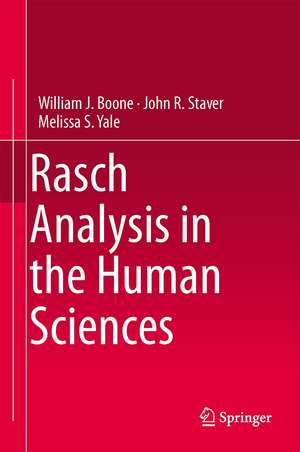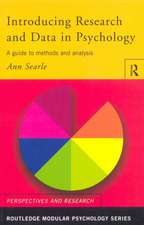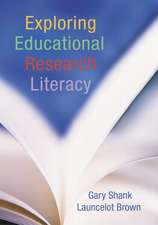Rasch Analysis in the Human Sciences
Autor William J. Boone, John R. Staver, Melissa S. Yaleen Limba Engleză Hardback – 2 ian 2014
Each of the 24 chapters presents a key concept using a mix of theory and application of user-friendly Rasch software. Chapters also include a beginning and ending dialogue between two typical researchers learning Rasch, "Formative Assessment Check Points," sample data files, an extensive set of application activities with answers, a one paragraph sample research article text integrating the chapter topic, quick-tips,and suggested readings.
Rasch Analysis in the Human Sciences will be an essential resource for anyone wishing to begin, or expand, their learning of Rasch measurement techniques, be it in the Health Sciences, Market Research, Education, or Psychology.
| Toate formatele și edițiile | Preț | Express |
|---|---|---|
| Paperback (1) | 954.14 lei 6-8 săpt. | |
| SPRINGER NETHERLANDS – 27 sep 2016 | 954.14 lei 6-8 săpt. | |
| Hardback (1) | 954.91 lei 6-8 săpt. | |
| SPRINGER NETHERLANDS – 2 ian 2014 | 954.91 lei 6-8 săpt. |
Preț: 954.91 lei
Preț vechi: 1164.52 lei
-18% Nou
Puncte Express: 1432
Preț estimativ în valută:
182.72€ • 199.10$ • 153.97£
182.72€ • 199.10$ • 153.97£
Carte tipărită la comandă
Livrare economică 24 aprilie-08 mai
Preluare comenzi: 021 569.72.76
Specificații
ISBN-13: 9789400768567
ISBN-10: 9400768567
Pagini: 500
Ilustrații: XVI, 482 p. 189 illus., 24 illus. in color.
Dimensiuni: 155 x 235 x 32 mm
Greutate: 0.87 kg
Ediția:2014
Editura: SPRINGER NETHERLANDS
Colecția Springer
Locul publicării:Dordrecht, Netherlands
ISBN-10: 9400768567
Pagini: 500
Ilustrații: XVI, 482 p. 189 illus., 24 illus. in color.
Dimensiuni: 155 x 235 x 32 mm
Greutate: 0.87 kg
Ediția:2014
Editura: SPRINGER NETHERLANDS
Colecția Springer
Locul publicării:Dordrecht, Netherlands
Public țintă
ResearchCuprins
What is Rasch Measurement & How Can Rasch Measurement Help Me?.- Rating Scale Surveys, A Rasch Rating Scale Analysis (Step I)-Reading Data and Running an Analysis.- Understanding Person Measures.- Item Measures.- Wright Maps - First Steps.- Wright Maps - Second Steps Fit.- How Well Does That Rating Scale Work? How Do You Know, Too?.- Person Reliability, Item Reliability and More.- What is an Ogive? How do I Use It?.- Some Wright Map Nuance, How To Set the Probability of Success at 65% (or whichever percentage you wish to choose).- Differential Item Functioning.- Linking Surveys and Tests.- Setting Pass/Fail Points and Competency Levels.- Expressing Competency Levels.- Quality of Measurement and Sample Size.- Missing Data: What should I do?.- Combining Scales.- Multifaceted Rasch Measurement.- The Rasch Model and Item Response Theory Models: Identical, Similar, or Unique?.- What Tables to Use?.- Key Resources for Continued Expansion of Your Understanding of Rasch Measurement.- Where Have We Been & What’s Next?.
Recenzii
This book provides a practical guide to using Rasch modeling and will be a great resource for anyone interested in learning how to analyze assessment data with Rasch.
Cari Herrmann Abell, Ph.D.
Senior Research Associate
American Association for the Advancement of Science Project 2061
Washington, D.C. U.S.A.
--------------------------------------------------------------------
Rasch Measurement in the Human Sciences represents a much needed, practical, and approachable guide to the use of Rasch methods and models within the field of education in general and in STEM fields most particularly. With a future ever more guided by data-driven decision-making, it is essential that our educators become more familiar with fundamental measurement concepts. Dr. Boone's new text provides readers with a powerful set of new skills, set within an accessible, easy to read framework.
Gregory Ethan Stone, Ph.D.
Professor of Educational Foundations and Leadership
University of Toledo
Toledo, Ohio USA
--------------------------------------------------------------------
For research in the Human Sciences it is absolutely necessary to know about the theoretical background and the applicability of Rasch analysis. Especially for improving teaching and learning we need a tool which is powerful enough not only to describe states but also to order them according to different criteria related to the learner. Bill Boone’s book leads educators as well as doctoral students to using Rasch as a model for measurement and profound interpretation of data and provides a profound and understandable introduction into a difficult topic.
Hans E. Fischer, Ph.D.
Prof. of Physics Education
Faculty of Physics
University Duisburg-Essen
Duisberg-Essen, Germany
--------------------------------------------------------------------
Dr. Boone has a long history of translating Rasch complexity into the understandable. This book will be invaluable to those in the social sciences who want to improve the quality of our science through improved measurement.
Cynthia W. Kelly, PhD
Prof. of Nursing
The University of Alabama
Tuscaloosa, Alabama USA
Box 870358
--------------------------------------------------------------------
That the Rasch approach to measurement improves measurement and the resulting decisions is well known. Needed is the spread of this measurement method to a broader audience. Improved measurement of human knowledge and sentiments is greatly needed in many disciplines and wider application of the Rasch model would address this need. A challenge is to make Rasch accessible to a broader audience. Dr. Boone has more than met this challenge in this book. Dr. Boone writes like a great teacher (which he is). Without compromising the rigor of Rasch he teaches the reader to understand and apply the Rasch measurement model.
Daniel McLinden, Ed.D.
Senior Director, Learning & Development
Assistant Professor, General & Community Pediatrics
Cincinnati Children’s Hospital Medical Center
------------------------------------------------------------------------------
"As a graduate student with zero Rasch experience, this book was crucial to my understanding of the importance of psychometrics, especially Rasch analysis. It was easy to comprehend and provided extensive opportunities to practice and to check for understanding. I would highly recommend this book to anyone who needs a basic introduction to Rasch analysis."
Jessican L. Overdorf
Graduate Student Miami University
--------------------------------------------------------------
"In EVERY chapter the conversation introductions between Ted and Isabelle do a great job of introducing each chapter, and the formative assessments help readers track their understanding of chapter topics. This book can teach anyone how to use Rasch analysis and Wright Maps without a headache".
Kelsey Janning
Graduate Student Miami University
Cari Herrmann Abell, Ph.D.
Senior Research Associate
American Association for the Advancement of Science Project 2061
Washington, D.C. U.S.A.
--------------------------------------------------------------------
Rasch Measurement in the Human Sciences represents a much needed, practical, and approachable guide to the use of Rasch methods and models within the field of education in general and in STEM fields most particularly. With a future ever more guided by data-driven decision-making, it is essential that our educators become more familiar with fundamental measurement concepts. Dr. Boone's new text provides readers with a powerful set of new skills, set within an accessible, easy to read framework.
Gregory Ethan Stone, Ph.D.
Professor of Educational Foundations and Leadership
University of Toledo
Toledo, Ohio USA
--------------------------------------------------------------------
For research in the Human Sciences it is absolutely necessary to know about the theoretical background and the applicability of Rasch analysis. Especially for improving teaching and learning we need a tool which is powerful enough not only to describe states but also to order them according to different criteria related to the learner. Bill Boone’s book leads educators as well as doctoral students to using Rasch as a model for measurement and profound interpretation of data and provides a profound and understandable introduction into a difficult topic.
Hans E. Fischer, Ph.D.
Prof. of Physics Education
Faculty of Physics
University Duisburg-Essen
Duisberg-Essen, Germany
--------------------------------------------------------------------
Dr. Boone has a long history of translating Rasch complexity into the understandable. This book will be invaluable to those in the social sciences who want to improve the quality of our science through improved measurement.
Cynthia W. Kelly, PhD
Prof. of Nursing
The University of Alabama
Tuscaloosa, Alabama USA
Box 870358
--------------------------------------------------------------------
That the Rasch approach to measurement improves measurement and the resulting decisions is well known. Needed is the spread of this measurement method to a broader audience. Improved measurement of human knowledge and sentiments is greatly needed in many disciplines and wider application of the Rasch model would address this need. A challenge is to make Rasch accessible to a broader audience. Dr. Boone has more than met this challenge in this book. Dr. Boone writes like a great teacher (which he is). Without compromising the rigor of Rasch he teaches the reader to understand and apply the Rasch measurement model.
Daniel McLinden, Ed.D.
Senior Director, Learning & Development
Assistant Professor, General & Community Pediatrics
Cincinnati Children’s Hospital Medical Center
------------------------------------------------------------------------------
"As a graduate student with zero Rasch experience, this book was crucial to my understanding of the importance of psychometrics, especially Rasch analysis. It was easy to comprehend and provided extensive opportunities to practice and to check for understanding. I would highly recommend this book to anyone who needs a basic introduction to Rasch analysis."
Jessican L. Overdorf
Graduate Student Miami University
--------------------------------------------------------------
"In EVERY chapter the conversation introductions between Ted and Isabelle do a great job of introducing each chapter, and the formative assessments help readers track their understanding of chapter topics. This book can teach anyone how to use Rasch analysis and Wright Maps without a headache".
Kelsey Janning
Graduate Student Miami University
Textul de pe ultima copertă
Rasch Analysis in the Human Sciences helps individuals, both students and teachers, master the key concepts and resources needed to use Rasch techniques for analyzing data from assessments to measure variables such as abilities, attitudes, and personality traits. Upon completion of the text, readers will be able to confidently evaluate the strengths and weaknesses of existing instrumentation, compute linear person measures and item measures, interpret Wright Maps, utilize Rasch software, and understand what it means to measure in the Human Sciences.
Each of the 24 chapters presents a key concept using a mix of theory and application of user-friendly Rasch software. Chapters also include a beginning and ending dialogue between two typical researchers learning Rasch, formative assessment check points, sample data fi les, an extensive set of application activities with answers, a one paragraph sample research article text integrating the chapter topic, quick-tips,and suggested readings.
Rasch Analysis in the Human Sciences will be an essential resource for anyone wishing to begin or expand their learning of Rasch measurement techniques, be it in the Health Sciences, Market Research, Education, or Cognitive Sciences.
“Rasch Analysis in the Human Sciences represents a much needed, practical, and approachable guide to the use of Rasch methods and models within the field of education in general and in STEM fields most particularly. With a future ever more guided by data-driven decision-making, it is essential that our educators become more familiar with fundamental measurement concepts. Dr. Boone’s new text provides readers with a powerful set of new skills, set within an accessible, easy to read framework.”
Gregory Ethan Stone, Professor of Educational Foundations and Leadership, University
of Toledo, Ohio, USA
“Bill Boone’s book leads educators as well as doctoral students to using Rasch as a model for measurement and profound interpretation of data and provides a profound and understandable introduction into a difficult topic.”
Hans E. Fischer, Professor of Physics Education, University of Duisburg-Essen, Germany
“This book will be invaluable to those in the social sciences who want to improve the quality of our science through improved measurement.”
Cynthia W. Kelly, Professor of Nursing, The University of Alabama, Tuscaloosa, Alabama, USA
Each of the 24 chapters presents a key concept using a mix of theory and application of user-friendly Rasch software. Chapters also include a beginning and ending dialogue between two typical researchers learning Rasch, formative assessment check points, sample data fi les, an extensive set of application activities with answers, a one paragraph sample research article text integrating the chapter topic, quick-tips,and suggested readings.
Rasch Analysis in the Human Sciences will be an essential resource for anyone wishing to begin or expand their learning of Rasch measurement techniques, be it in the Health Sciences, Market Research, Education, or Cognitive Sciences.
“Rasch Analysis in the Human Sciences represents a much needed, practical, and approachable guide to the use of Rasch methods and models within the field of education in general and in STEM fields most particularly. With a future ever more guided by data-driven decision-making, it is essential that our educators become more familiar with fundamental measurement concepts. Dr. Boone’s new text provides readers with a powerful set of new skills, set within an accessible, easy to read framework.”
Gregory Ethan Stone, Professor of Educational Foundations and Leadership, University
of Toledo, Ohio, USA
“Bill Boone’s book leads educators as well as doctoral students to using Rasch as a model for measurement and profound interpretation of data and provides a profound and understandable introduction into a difficult topic.”
Hans E. Fischer, Professor of Physics Education, University of Duisburg-Essen, Germany
“This book will be invaluable to those in the social sciences who want to improve the quality of our science through improved measurement.”
Cynthia W. Kelly, Professor of Nursing, The University of Alabama, Tuscaloosa, Alabama, USA
Caracteristici
Offers step-by-step instruction on how-to use Rasch analysis Features a combination of Rasch conversations, Rasch data analyses, Rasch theory, and formative assessments Written for a broad audience as an introductory text: light on the mathematics, heavy on the practical aspects, and clear on the concepts and theory All activities and tables utilize user-friendly (and free) Ministeps Rasch software that prepares readers to confidently utilize Rasch Winsteps software














